| Construction Rating: | starstarstarstarstar_border |
| Flight Rating: | starstarstarstarstar_border |
| Overall Rating: | starstarstarstarstar_border |
| Manufacturer: | Quest  |
Brief:
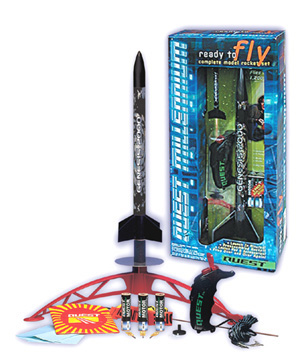 This is a RTF (Ready To Fly) rocket that comes with a complete Quest launch kit. It
is one is a series of the millennium range of RTF rockets with the other two being Vertigo (purple) and Ruthless (Red).
It includes a plastic Quest Launch Pad with adjustment for launch angle, two piece launch rod, a nice hand grip
controller powered by a 9 Volt battery, wadding, Q2 ignitors, 3 Quest B6-4 motors and a parachute. Although I believe
it was supposed to come with 3 Quest A6-4 motors according to product specs.
This is a RTF (Ready To Fly) rocket that comes with a complete Quest launch kit. It
is one is a series of the millennium range of RTF rockets with the other two being Vertigo (purple) and Ruthless (Red).
It includes a plastic Quest Launch Pad with adjustment for launch angle, two piece launch rod, a nice hand grip
controller powered by a 9 Volt battery, wadding, Q2 ignitors, 3 Quest B6-4 motors and a parachute. Although I believe
it was supposed to come with 3 Quest A6-4 motors according to product specs.
Construction:
This kit was nearly RTF (Ready To Fly). It needed the parachute to be assembled and attached first. I was surprised
that it did not have a parachute already made up and attached in the rocket. Although this was my first rocket so I had
no idea what the norm was.
The rocket has plastic one piece fin can (4 fins) with an integral launch lug. Also it has a one piece plastic nose cone and a long shock cord. The rocket is black with a shiny decal stuck onto cardboard body tube.
Con: The rocket needed the parachute assembled, and my only problem later was that I'm not a knot expert so every 3 flights one of the parachute strings would come undone.
Finishing:
I chose black over the other colours as I figured it would be easiest to see in sky and find on ground. The rocket is
all black, and has a shiny reflective like decal that looks quite nice, but I think the heat gets to it and its lifting
around the edges.
Construction Rating: 4 out of 5
Flight:
At time of this writing I have had 18 successful launches, 15 on Quest A6-4 and 3 on Quest B6-4.
I had never seen a model rocket before as I live in a small city in New Zealand, so had no idea what to expect. I also was new to the equipment, so I didn't notice that the 3 included motors which were supposed to be A6-4s were for some reason B6-4s.
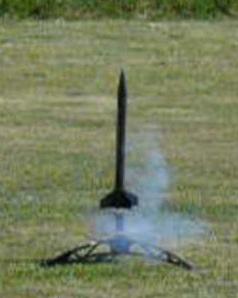
I recorded my first flight on my digital camera (bearing in mind I was expecting A motor height, not B), it went straight up and fast. It went so high, it went out of visual range of my camera! The parachute deployed flawlessly, and it was easy to follow until it landed. Drifted about 150 metres from launch pad. After adjusting the launch pad to point into wind, the landing was closer to 70 metres.
"A" motors are much better if wanting it to land 10 to 50 metres from launch pad. Rocket always flies straight, but will weathercock into wind quickly. As flight is lower, one can see it much better, like wadding coming out and point of parachute deployment.
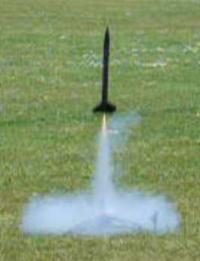 On "A" motors, it seemed to always be about 1 second after apogee when
nose is just starting to point down that parachute would deploy. The parachute and shock cord surprised me with their
strength, even in a strong wind (around 30km/h) when parachute deploys, the rocket gets quite a strong jerk but doesn't
rip or break anything.
On "A" motors, it seemed to always be about 1 second after apogee when
nose is just starting to point down that parachute would deploy. The parachute and shock cord surprised me with their
strength, even in a strong wind (around 30km/h) when parachute deploys, the rocket gets quite a strong jerk but doesn't
rip or break anything.
I am not brave enough to try a C motor in it, but I plan to remove parachute and install a streamer, and based on how that performs I may try the larger motor then. But for now I wouldn't use a C unless I planned to lose it!
Recovery:
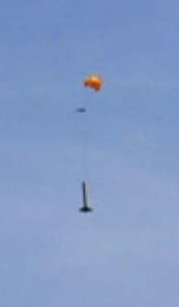 I believe the rocket has a Kevlar®
shock cord and a 14 inch plastic parachute with 6 points of attachment for shroud lines. It works very well at slowing
descent, but causes the rocket to drift quite a long way (especially where I live on the coast with sea breezes).
I believe the rocket has a Kevlar®
shock cord and a 14 inch plastic parachute with 6 points of attachment for shroud lines. It works very well at slowing
descent, but causes the rocket to drift quite a long way (especially where I live on the coast with sea breezes).
I always use 3 or 4 wadding balls but the parachute did get scorched once (minor). But maybe over time the heat has got to it as it now often doesn't unroll after ejection charge goes off. I've read about people using talc powder, that may solve the problem but I am planning on removing the parachute and trying the rocket out on a streamer. Ideally, I need the rocket to come down without drifting away in wind a long distance.
Flight Rating: 4 out of 5
Summary:
I believe this to be excellent value, as it comes with full Quest launch gear, rocket and motors. All that is needed
is a 9 volt battery for the launch controller. It would make a great gift for anyone and best way to get started in
rocket (in NZ anyway).
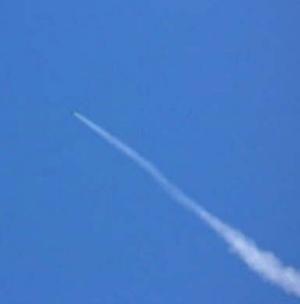
Flies and performs very well in every way. I like it so much that I am now just sticking to things from Quest and already ordered another 3 rockets within weeks of getting this model.
A6-4 motors fly low with an average 20 seconds from launch to touchdown, B6-4 motors go very high around 60 seconds from launch to touchdown, not going to try C6-5s yet as I think I will need a larger area.
Overall Rating: 4 out of 5
Sponsored Ads
 |
 |











